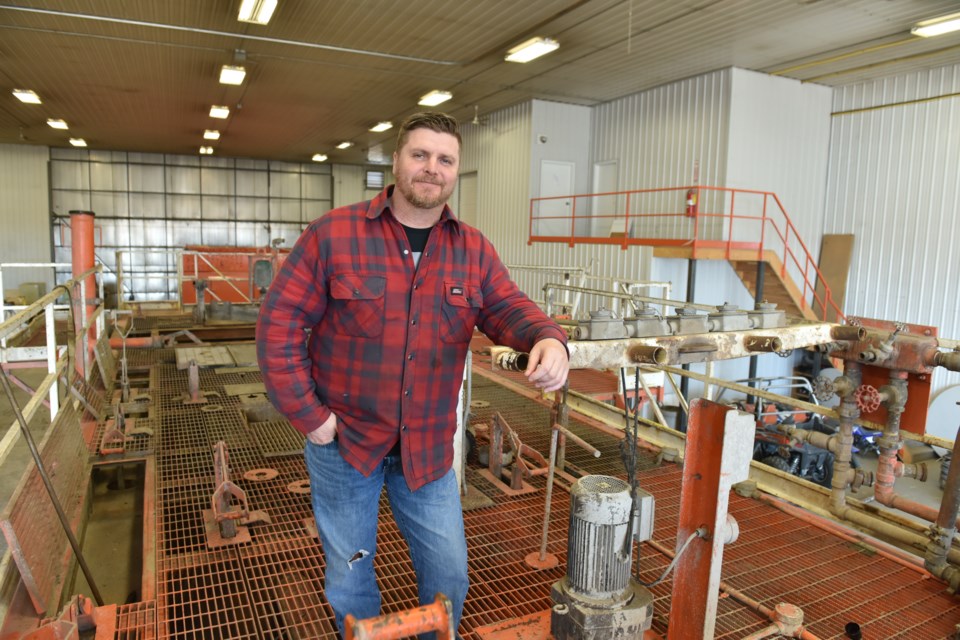Weyburn ŌĆō Cory Hicks, president of Weyburn-based Panther Drilling, was one of the first people to post a video saying his company would be taking part in the Regina Rally Against the Carbon Tax. And they did just that, on April 4.
On March 21, he explained why they were taking part.
ŌĆ£Basically, IŌĆÖm against the carbon tax. The carbon tax will decimate an industry thatŌĆÖs already going through a lot right now.
ŌĆ£ItŌĆÖs not just the oil industry. ItŌĆÖs going to affect all industry. ItŌĆÖs going to affect the single mom with three kids that has to pay her heating bill. ItŌĆÖs going to affect, obviously, my business. ItŌĆÖs going to affect farmers. ItŌĆÖs going to affect the bottom line of the hotel owners. ItŌĆÖs going to affect the quality of life, quite frankly, and it doesnŌĆÖt make any sense to me.ŌĆØ
He hadnŌĆÖt yet calculated the cost to Panther. The next bid season is coming up.
ŌĆ£ThereŌĆÖs a lot of uncertainty,ŌĆØ he said, regarding dealing with the carbon tax in those bids.
Beyond the carbon tax, the convoy and rally focused on three other points ŌĆō building pipelines, killing Bill C-69 and Bill C-48.
ŌĆ£Essentially, with the pipelines, we need to get to tidewater. As an industry, weŌĆÖre selling to one customer. Anyone in business knows thatŌĆÖs not healthy, because if you only have one customer that youŌĆÖre selling to, they can essentially dictate price. People can talk about the world market and supply and demand. If we have too much, the price goes down. It also depends on the grade of oil, too; heavy, light, medium, whatever they need to blend.
Asked if the lack of new pipelines has affected the amount they have drilled in the last year, Hicks said, ŌĆ£Oh, for sure. ItŌĆÖs affected the amount weŌĆÖve drilled for the last four years. Basically, if the oil companies are not drilling, if thereŌĆÖs not investment money going into Canada, into the oilfield, it makes it hard for me to drill for somebody. ThereŌĆÖs only been a few oil companies that have been staying with Canada, and Saskatchewan, where IŌĆÖm predominantly based in. The numbers went down exponentially. ItŌĆÖs absolutely crazy.ŌĆØ
Regarding the direct impact on jobs, he said, ŌĆ£I had 106 employees in summer of 2014. Over the course of the last five years, it went up and down, but essentially I lost half my staff. ItŌĆÖs hit and miss, too. ThereŌĆÖs a chance, perhaps, after breakup, I could get all four rigs out. It could change, too.
ŌĆ£ThereŌĆÖs so much uncertainty. If you asked me, after breakup, how many rigs youŌĆÖve got going, IŌĆÖve got two rigs going for sure. But you never know how ŌĆśfor sureŌĆÖ for sure is. If I had a 10-well program, until we TDŌĆÖd (total depth) the tenth well, I wouldnŌĆÖt know for sure.
ŌĆ£The thing is, in the oilfield, weŌĆÖre not looking for handouts. We need domestic policies. If bill C-69 comes to fruition, which IŌĆÖve actually sat and read parts of that bill, but the premise I get out of it is that anybody that wants to object to a pipeline can have their day in court. They can have their day to basically discuss in front of the regulators to say whatever and hold things up. If you want to build a pipeline in 2019 and it goes under this review, it could go on for years before you get approved, which is what weŌĆÖve seen with Trans Mountain, which we saw with the other pipelines as well. They were actually approved, and then it was taken away, because we didnŌĆÖt get the proper approval with everything.
ŌĆ£They moved the goalposts. ThatŌĆÖs whatŌĆÖs frustrating.ŌĆØ
He was planning to fill a pickup for the convoy, and true to his word, Hicks could be seen near the front, listening intently as Premier Scott Moe spoke on April 4.




